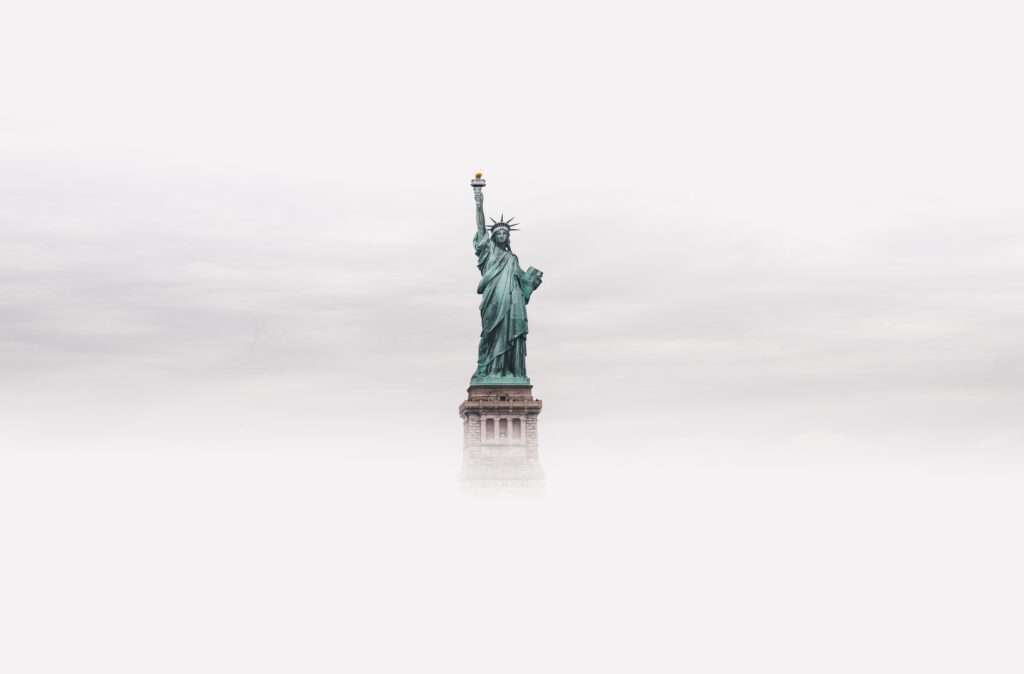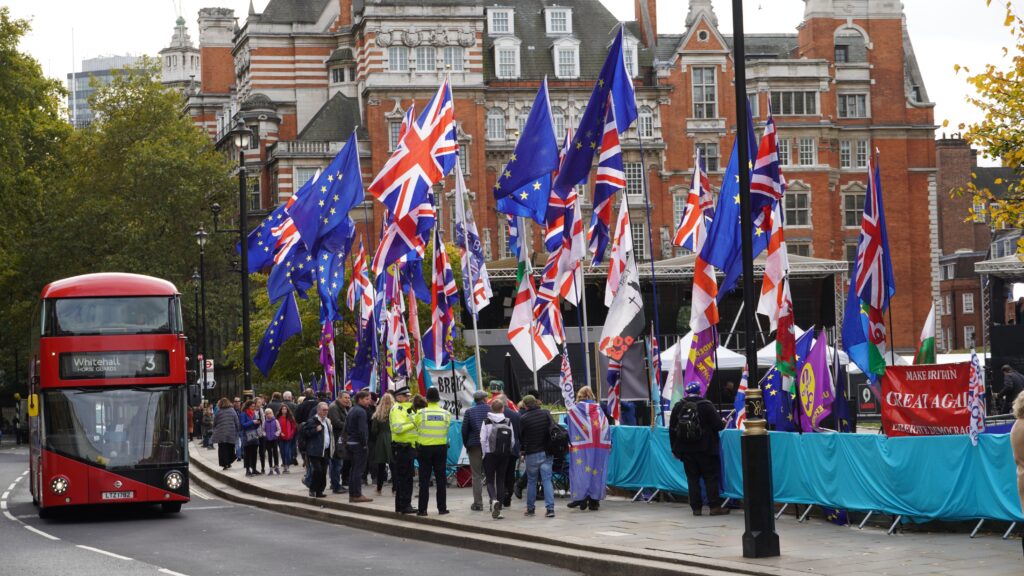
A greater MAGA and a better Brexit – towards true patriotism
Patriotism involves recognising the limits of one’s own country and its need to be complemented by others, argues Joseph Evans.
Like Shakespeare’s Marc Antony, “I come to bury Caesar, not to praise him”. Both as a priest and a non-American it’s not my place either to laud or denigrate President Trump. I merely want to ask what his extraordinary challenge to his nation’s political establishment has to teach us about the virtue of patriotism, considering also my own country’s recent bitter exit from the European Union.
Donald John Trump appeared as an outsider on the US political scene with a clear and simple message which made him immediately attractive to many who felt their concerns were not being met by the existing system: ‘Make America great again.’ But this pithy statement begs many questions, which – as far as I can see – few have ever really tried to answer in depth. Was America really great in the first place? And assuming it was, how? What do we mean by ‘great’? And then again, if it was great, how did it cease to be so, that its greatness needs reviving? And how can this revived greatness be achieved?
Of course, like all political slogans, it was never meant to be thought about too carefully. It sought to capture a mood, not spark an intellectual discussion.
With all its flaws, America is great, not only for its status as a political superpower but for the many positive values its history and life encapsulate: its openness to all as a land of opportunity, its profoundly religious sense, the entrepreneurial spirit it has always encouraged …

The thinking behind the ‘Make America great again’ slogan seemed paradoxically both to hark back to and threaten these values. For Trump’s critics, there was much in his programme which was not open to all, such as his wall proposal, his attitude towards refugees, and the travel ban for certain Muslim countries. The MAGA approach could also be quite selective in the religious principles it espoused. Thus many of its proponents, Catholics too, found Pope Francis’ pronouncements on social and economic questions most definitely not to their liking.
Yet the reality, as always, was more nuanced. On the one hand, while the MAGA idea of greatness seemed to involve a ‘populist, protectionist, isolationist, and nationalist’ worldview, to borrow Wikipedia’s comments on President Trump’s political position, it rightly espoused all those key values which made America great in the first place.
These include the central place of God in the nation’s life, the traditional understanding of the family (man, woman and children) and its key role in society, the valuing of hard work and enterprise, and a profound respect for personal freedom, all of which many MAGA proponents feel are threatened by policies emanating from the other side of the political and social divide.
And their fears might well be justified, at least as far as God and the family are concerned. Trump’s successor presents himself as a profoundly religious and family-oriented man but while some of the policies he has espoused, and has seemed already to endorse as President, demonstrate a deep Christian concern for the poor and oppressed, others run contrary to basic Christian teaching on life and sexuality.
But crossing the pond to my own country, if only the distinctions were so binary!
The Brexit debate (or really, slanging match) was far messier and less idealistically inspired.
Most Brexiteers didn’t rail against the European Union on the grounds that its policies threatened the traditional moral values which had made Britain the country it is. On that score most Brexiteers and Remainers were perfectly in agreement. They seemed quite happy with a pretty immoral Britain: consumerist, sexualised, and with the family structure in tatters, be it with or without the European Union.

For many Brexiteers the key issues were sovereignty and self-determination. ‘Take back control’ was the UK’s own version of MAGA, the slogan which encapsulated our fears and grievances, the great rallying cry against foreign oppression and the dark forces which seemed to threaten us. So much so that the European Union itself was often forgotten and the real enemy became foreigners in general.
Freeing ourselves from the European Union would free us too from all unwanted immigration.
Somehow we were magically going to continue our wealthy lifestyle, without having children and without needing overseas workers to maintain our economy.
And then, liberated from Brussels’ ‘bureaucracy’ (which had become a new swear word), Britain was once again going to be a great player on the world stage. No-one envisaged (or at least no one dared to say they did) that the British Empire would rise from its ashes but, freed from Europe’s shackles, we could once again wield power and influence across the seas.
But don’t think the Remainers were any more idealistic. Staying ‘in Europe’, the argument went, ‘suited our national interests, was essential for our economy, meant access to a necessary market we would lose at our peril’.
No-one bothered about the cultural and spiritual values which have tied us to our fellow Europeans for centuries, and which meant that, for all our differences and wars, we could still speak to and understand each other. These include the key role of reason and human thought, a sense of law and of the dignity of the person, the valuing of art and beauty, all deriving from a shared Christian foundation.
Some reflected on the years of peace which closer ties with Europe have brought to the continent. But these were few. And only a small minority lamented the possible loss of the human capital – or better said, depth of humanity – which having so many French and Spanish and Italians and Slavs and others in Britain has brought to our land. Perhaps Londoners did, which is where the presence of overseas residents is most felt and which was possibly why the capital voted so overwhelmingly pro-Remain.
So why was the chasm between MAGA followers and their opponents, between Brexiteers and Remainers, so bitter and unbridgeable?
It seems to me that, on both sides of the Atlantic, and on both sides of each debate, the problem was a failure to understand what it means to be a great nation and a failure to understand the true nature of patriotism.

The recently deceased Rabbi Jonathan Sacks in his stimulating 2020 work Morality: Restoring the Common Good in Divided Times offered this helpful distinction between nationalism and patriotism, quoting from George Orwell. Nationalism, he wrote, is ‘inseparable from the will to power’. It is ‘power hunger tempered by self-deception’. But patriotism is ‘devotion to a particular place and a particular way of life, which one believes to be the best in the world but has no wish to force upon other people.’
This is an excellent point of departure, particularly in its analysis of nationalism, but I would qualify what he writes about patriotism. In my opinion, a patriot should love his or her country, should be proud of it and all the good it embodies, but without necessarily thinking it is the ‘best in the world’.
Just as it’s hard to define ‘great’, how can we define ‘best’? I look at my own nation, the United Kingdom, and see so much good in it which I am proud of: its sense of fairness and moderation, the general honesty of its police and legal system, the (usual) accountability of politicians … But I also see many faults: the Anglo-Saxon coldness of character, a growing irreligiosity, the weakness of family life, to say nothing of our poor cuisine!
As much as Latins can frustrate me for their loose approach to public morality (for some Italians, paying taxes is a last resort if all else fails and buying a bus ticket is often an optional extra), I find a warmth of heart in them which I do not find in Britons, as well as their incredible tradition of visual art far surpassing anything in my land. And so travelling abroad to encounter such people enriches me, and when they come to live among us, my country is enriched.
There is something profoundly humble about patriotism which differentiates it from nationalism.
True patriotism is recognising that my nation is not complete in itself and never can be. It has its limitations and must always recognise them. For all its good, it has so much to learn from other peoples.
Many forms of nationalism deliberately ignore such limitations through a deliberate self-deluding myth, and merely blame some other group or nation for any woes which that country might be experiencing – just as the Nazis blamed the Jews.
Yet patriotism does and must involve self-love and love of one’s people and one’s heritage. If we do not know how to love ourselves, how can we love others? A surprising and disturbing phenomenon we are witnessing on the European continent is what Joseph Ratzinger (later Pope Benedict XVI) described in 2004 as ‘a strange form of self-hate we can only consider pathological’.
It’s a form of hatred which leads us to see everything Europe has done as bad. As Ratzinger put it in his remarkable assessment, ‘all [such an attitude] sees in its own history is what is disgraceful and destructive, while it no longer seems able to perceive what is great and pure’. And so Europe is reduced to its colonial past, seen in its most negative and brutal light, ignoring the continent’s extraordinary cultural, humanistic and spiritual legacy.
What Ratzinger said about Europe also manifests itself in the United States, and it is precisely this self-hatred which the MAGA attitude understandably rebelled against. A more balanced initial approach towards America’s contribution to the world – accepting both the good and the bad – would not have provoked the MAGA reaction.
The West ‘no longer loves itself’, Ratzinger lamented. “In order to survive, Europe needs a new, critical and humble acceptance of itself; but only if it really wishes to survive.”
The 20th century saw a growing appreciation in philosophical and religious thought of the need for relationships. Man is fundamentally a relational being and is only fully him or herself in relationship. The person is not and cannot be an isolated individual.
Such ‘Personalist’ thought was developed by major Jewish thinkers like Levinas and Buber and found its most powerful Christian expression in the Catholic Church’s Second Vatican Council, which declared that man ‘cannot fully find himself except through a sincere gift of self’ (Gaudium et Spes, 1965), an idea later insisted on by Pope St John Paul II.
It was as if the religious tradition felt a growing need to resist other philosophical ideas which emphasised the radical isolation of the person: the autonomous individual with no need for others.
It is precisely this Personalism which needs to be applied to international relations. Nations only find themselves in relationship with others. They can only truly be themselves in their self-giving, by sharing with each other what Gaudium et Spes calls ‘the treasures hidden in various forms of human culture’.
Hatred of the outsider is to return to our most primitive, most tribal state. Welcoming the ‘other’ is human flourishing, it makes civilisation.
Against proud and greedy nationalism, we need to promote a new world order, a new idea of nationhood, which sees the greatness of a country not in its power to conquer or dominate but in its capacity to give.
How could America be great again? By accepting its vocation to serve, by seeing that all its power and wealth are a gift from God for a limited time.
And if only the Brexit debate had kept this idea of service more in mind. It shouldn’t have been a debate over what we could get from Europe but what we could give to it – and give too to our former colonies. A greater sense of our debt to the continent we form part of and of the countries we once ruled would have led to a more constructive discussion.
It shouldn’t have only been about sovereignty, but about service; not just about our future but about our past, and how we could be faithful to that too, celebrating our achievements and atoning for our faults.
But all is not lost, either in the US or the UK. Both nations could still re-discover their vocation to serve and find a new way of being in the world. This might help the US, for example, to forge a better relationship with both Islamic nations and its southern Latin neighbours.
Britain, though far less powerful, still has much it could offer the world. Instead of being businesses built on the cash of foreign students, our wonderful universities could become an international service to help other nations develop. I’m not saying we shouldn’t charge but a new approach might find new solutions which benefit both our youth and those of other countries.
Likewise with the extraordinary National Health Service, Britain’s pride and joy. At present, for all its good, it serves as a brain and talent drain from poorer countries, taking many of their best doctors and nurses and thereby depleting their healthcare.
Could we not find a way for the NHS to become an international beacon of good practice and formation, preparing medical professionals to return to their own countries, or sending out experts from here to help develop healthcare systems abroad?
A humbler, more generous approach to nationhood, seeing our power as service, our wealth as a way to enrich others. This might sound incredibly naïve but it is also possible: for Britain, the US and the European Union too. But, more than possible it is also imperative, for it is the only way that will save the Old Continent – and America – from certain and terminal decline.

